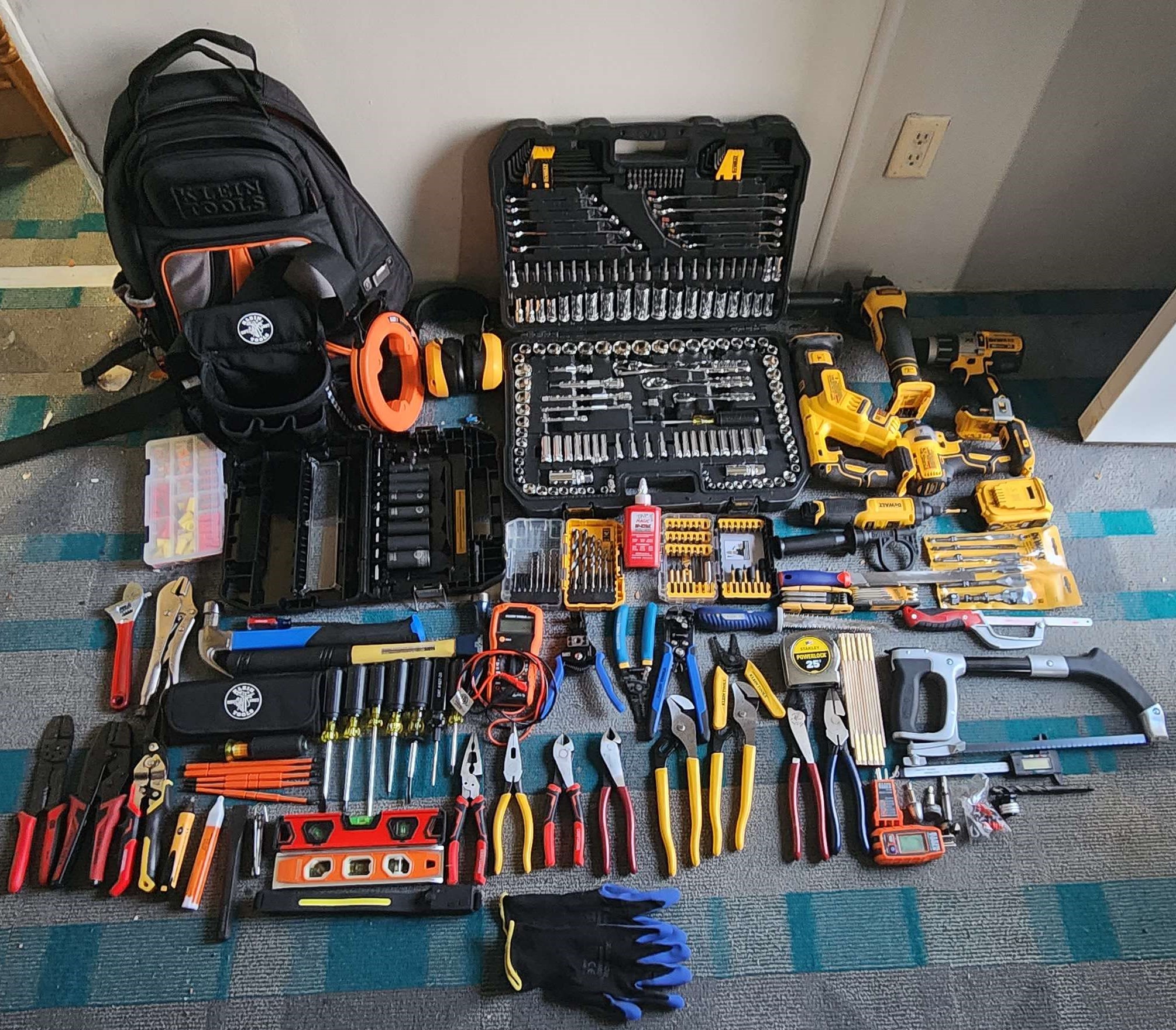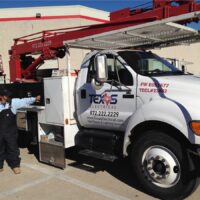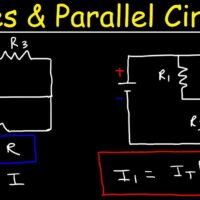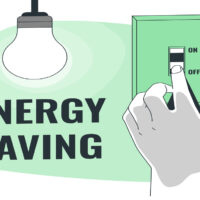An electrician’s tool set includes essential tools like pliers, screwdrivers, and voltage testers. These tools ensure safe and efficient electrical work.
Electricians rely on a comprehensive tool set to perform their tasks efficiently and safely. A well-equipped tool set typically includes pliers, screwdrivers, wire strippers, voltage testers, and multimeters. Each tool serves a specific purpose, from cutting and stripping wires to measuring electrical currents and ensuring safe installations.
Investing in a high-quality tool set can significantly enhance an electrician’s ability to tackle various electrical jobs, from simple repairs to complex installations. Proper tools not only improve work quality but also ensure safety, reducing the risk of accidents and electrical hazards.
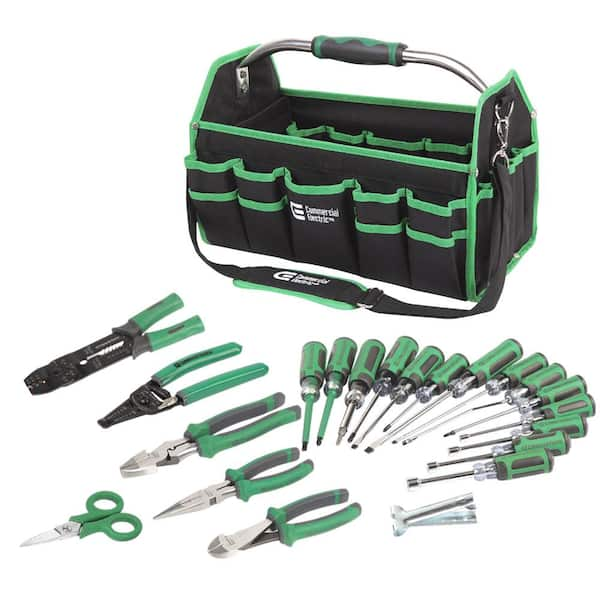
Credit: www.homedepot.com
Introduction To Electricians’ Tool Sets
Every electrician needs a reliable tool set. The right tools make the job easier and safer. An electrician’s tool set includes many essential items. This guide will help you understand these tools better.
Importance Of Quality Tools
Quality tools are crucial for electricians. They ensure safety and efficiency. Cheap tools can break easily and cause accidents. Investing in good tools saves time and money in the long run. Durable tools last longer and perform better.
Basic Vs. Advanced Kits
Electricians’ tool sets come in two types: basic and advanced. Basic kits include essential tools for simple tasks. Advanced kits have more specialized tools for complex jobs.
| Basic Kit | Advanced Kit |
|---|---|
| Wire Strippers | Multimeter |
| Screwdrivers | Voltage Tester |
| Pliers | Circuit Finder |
| Tape Measure | Fish Tape |
Basic Kits are ideal for beginners. They are affordable and cover most needs. Advanced Kits are for professionals. They include tools for more detailed work. Choose a kit based on your skill level and job requirements.
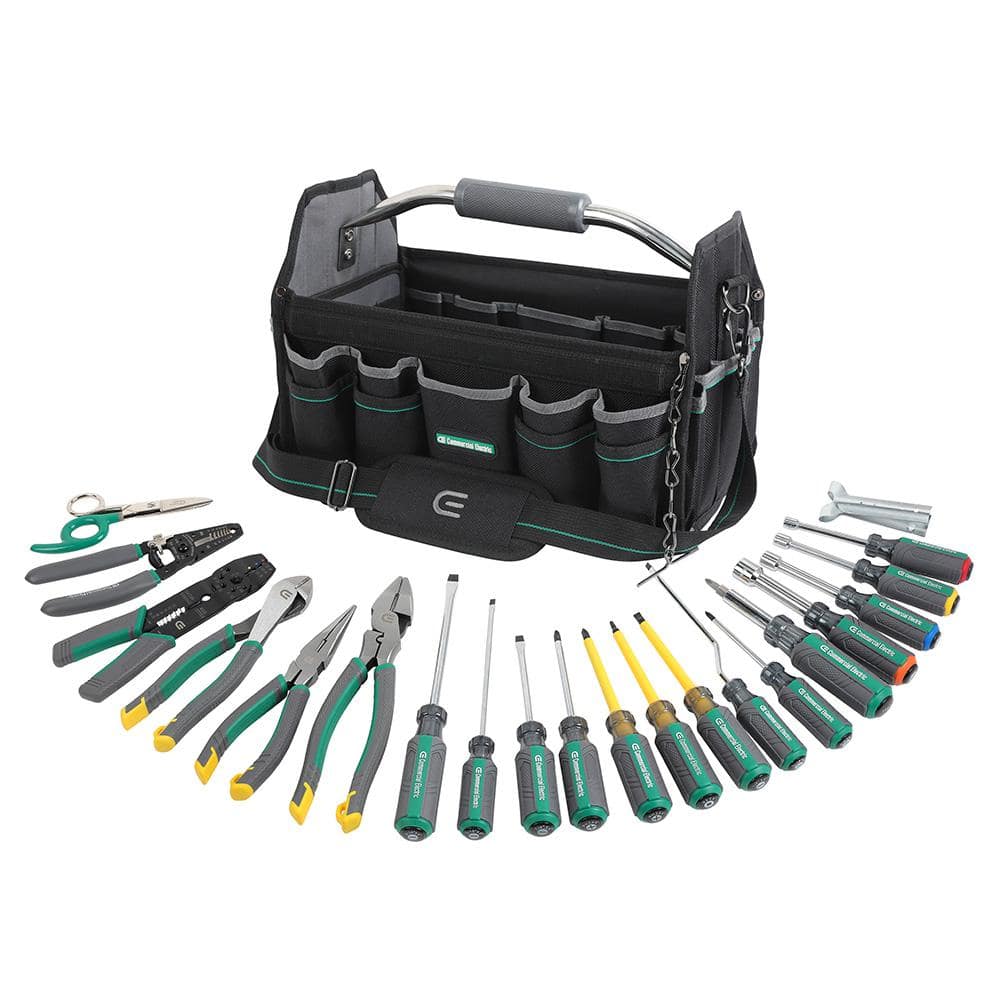
Credit: www.homedepot.com
Must-have Hand Tools
Every electrician needs a reliable set of hand tools. These tools help with various tasks, from cutting wires to tightening screws. This section covers the most important hand tools for electricians.
Pliers Varieties
Pliers are essential for gripping, cutting, and bending wires. Here are some key types:
- Needle-Nose Pliers: Ideal for reaching tight spaces and making precise bends.
- Diagonal Cutting Pliers: Perfect for cutting wires cleanly.
- Linesman Pliers: Great for twisting wires and gripping.
Screwdrivers And Nut Drivers
Screwdrivers and nut drivers are crucial for fastening screws and nuts. Key types include:
- Flathead Screwdrivers: Used for screws with a straight, flat groove.
- Phillips Screwdrivers: Designed for screws with a cross-shaped groove.
- Nut Drivers: Handy for tightening nuts and bolts.
Wire Strippers And Cutters
Wire strippers and cutters are vital for preparing wires for connections. Essential tools include:
- Standard Wire Strippers: Remove insulation from wires without damaging them.
- Automatic Wire Strippers: Strip wires quickly and easily.
- Wire Cutters: Cut wires to the desired length.
| Tool | Primary Use |
|---|---|
| Needle-Nose Pliers | Reaching tight spaces |
| Diagonal Cutting Pliers | Cutting wires |
| Linesman Pliers | Twisting wires |
| Flathead Screwdrivers | Flat groove screws |
| Phillips Screwdrivers | Cross-shaped screws |
| Nut Drivers | Tightening nuts |
| Standard Wire Strippers | Removing insulation |
| Automatic Wire Strippers | Stripping wires quickly |
| Wire Cutters | Cutting wires |
Measuring And Testing Devices
Electricians need accurate tools to ensure safety and efficiency. Measuring and testing devices are crucial in their tool sets. These devices help electricians diagnose and fix electrical issues quickly. Let’s explore some essential tools.
Multimeters
Multimeters are versatile and essential for any electrician. They measure voltage, current, and resistance. A good multimeter provides accurate readings. It helps in troubleshooting electrical problems. Digital multimeters are easy to read with clear displays.
| Feature | Benefit |
|---|---|
| Auto-ranging | Saves time by automatically selecting the measurement range. |
| Backlit Display | Makes it easy to read in low-light conditions. |
Voltage Testers
Voltage testers are simple yet vital tools. They detect the presence of voltage in a circuit. This helps in identifying live wires. Non-contact voltage testers are safe and easy to use. They provide a quick way to ensure a circuit is de-energized.
- Handheld and lightweight.
- Visual and audible indicators.
- Battery-operated for convenience.
Circuit Finders
Circuit finders help electricians trace circuits in a building. They locate circuit breakers and fuses. This is essential for troubleshooting and repairs. Circuit finders save time by quickly identifying the right breaker.
- Plug the transmitter into an outlet.
- Use the receiver to scan the breaker panel.
- The receiver signals the correct breaker.
Circuit finders are reliable and easy to use. They improve efficiency in electrical work.
Power Tools For Efficiency
Electricians rely on a variety of power tools to boost their efficiency. These tools help them complete tasks quickly and accurately. From drilling holes to cutting cables, having the right tool is crucial. Let’s delve into some of the essential power tools for electricians.
Cordless Drills
Cordless drills are a staple in every electrician’s toolset. They offer the flexibility to work in tight spaces without worrying about cords. Modern cordless drills come with powerful batteries that last longer. These drills also feature variable speed settings. This allows electricians to adjust the speed based on the task at hand. Some drills even have LED lights to illuminate dark work areas.
Key features to look for in a cordless drill:
- Long-lasting battery
- Variable speed settings
- LED light for illumination
- Ergonomic design for comfort
Saws For Electricians
Saws are indispensable for cutting through various materials. Electricians often use reciprocating saws and circular saws. Reciprocating saws are great for cutting through metal conduits and pipes. Circular saws are ideal for cutting through wood and plastic. Both types of saws offer precision and speed, making them invaluable tools.
Common types of saws used by electricians:
| Type of Saw | Best For |
|---|---|
| Reciprocating Saw | Metal conduits, pipes |
| Circular Saw | Wood, plastic |
Powerful Crimpers
Crimpers are essential for creating secure electrical connections. Electricians use crimpers to join wires and cables. Powerful crimpers ensure a tight and reliable connection. They also reduce the risk of electrical faults. Some crimpers come with interchangeable dies. This allows electricians to work with different wire sizes.
Benefits of using powerful crimpers:
- Secure electrical connections
- Reduced risk of faults
- Interchangeable dies for versatility
- Ergonomic handles for ease of use
Safety Equipment In Tool Sets
Safety is crucial for electricians. Proper safety equipment in tool sets ensures protection. This article highlights key safety items.
Insulated Gloves
Insulated gloves protect electricians from electric shocks. They are made of rubber and provide a barrier against electricity. Insulated gloves come in different voltage ratings. Always choose the correct rating for your job.
- Made of durable rubber
- Protect against electric shocks
- Available in various voltage ratings
Safety Goggles
Safety goggles protect eyes from debris and sparks. They are essential for any electrical work. Safety goggles fit snugly around the eyes. They offer clear vision and protection.
| Feature | Benefit |
|---|---|
| Snug fit | Prevents debris from entering eyes |
| Clear lens | Provides unobstructed vision |
Lockout/tagout Kits
Lockout/tagout kits ensure machines stay off during maintenance. They prevent accidental startup of equipment. Kits include locks, tags, and devices to secure switches. Lockout/tagout kits are vital for workplace safety.
- Locks to secure switches
- Tags to indicate maintenance
- Devices to isolate energy sources
Specialized Electrical Tools
Electricians need specialized tools for their work. These tools help them do their job safely and efficiently. In this section, we will explore three essential tools for electricians: Fish Tapes, Conduit Benders, and Cable Pullers.
Fish Tapes
Fish tapes help electricians pull wires through walls or conduits. They are long, thin, and flexible. Fish tapes are usually made of steel or fiberglass. They are essential for running new wires in existing structures.
- Material: Steel or Fiberglass
- Length: Varies, typically 25-100 feet
- Use: Pulling wires through walls or conduits
Conduit Benders
Conduit benders are used to shape conduits. This tool allows electricians to bend conduits to the correct angle. This is important for fitting conduits in tight spaces.
- Types: Hand benders, Hydraulic benders
- Materials: Aluminum, Steel
- Use: Shaping conduits to fit in spaces
Cable Pullers
Cable pullers help electricians pull cables through long distances. These tools make the job easier and faster. Cable pullers can be manual or electric.
- Types: Manual, Electric
- Capacity: Varies, can pull heavy cables
- Use: Pulling cables over long distances
These specialized tools are essential for electricians. They help ensure the job gets done right.
Tool Storage And Organization
Keeping your tools organized is crucial for electricians. A well-organized tool set saves time and increases efficiency. Below, we explore different ways to store and organize your tools.
Tool Belts
Tool belts are essential for keeping tools handy. They help you carry your most-used tools. Tool belts come in various sizes. Some have multiple pockets for different tools. Choose a belt that fits well and distributes weight evenly.
Benefits of using tool belts:
- Quick access to tools
- Reduces trips back and forth
- Increases work efficiency
Tool Bags And Cases
Tool bags and cases offer a portable way to store and transport tools. They come in various styles and sizes. Some have padded compartments for delicate tools. Others have hard shells for extra protection.
Advantages of tool bags and cases:
- Easy to carry
- Protects tools from damage
- Keeps tools organized
Portable Workstations
Portable workstations are ideal for larger jobs. They offer a flat surface to work on. They often come with drawers and shelves for storing tools. Some even have wheels for easy movement around the job site.
Features of portable workstations:
- Provides a work surface
- Multiple storage options
- Easy to move
Maintenance And Care For Tools
Ensuring the longevity and efficiency of your electricians tool sets requires proper maintenance and care. Regular upkeep not only extends the life of your tools but also ensures safety and reliability during use. Below are essential practices for maintaining and caring for your tools.
Cleaning Practices
Regular cleaning is crucial to keep your tools in top condition. Dust, dirt, and grime can reduce performance and cause wear.
- Wipe down tools with a clean cloth after each use.
- Use a soft brush to remove debris from small crevices.
- Avoid water exposure; instead, use a damp cloth for stubborn dirt.
Keeping your tools clean prevents rust and corrosion. This ensures they remain effective and safe to use.
Regular Inspections
Frequent inspections help identify potential issues before they become problems. Checking your tools for wear and tear is essential.
- Inspect handles for cracks or splits.
- Check blades and edges for dullness or nicks.
- Ensure moving parts operate smoothly without sticking.
Regular inspections help maintain tool performance and safety. Identifying problems early can prevent accidents.
Tool Replacement
Even with the best care, tools will eventually need replacement. Knowing when to replace a tool is vital for safety and efficiency.
- Replace tools with damaged handles to avoid injury.
- Discard tools with blunt or damaged edges.
- Replace tools that no longer function correctly.
Keeping your tool set updated ensures optimal performance. It also maintains safety standards and reliability.
Staying Up-to-date With Industry Standards
Electricians need to stay updated with industry standards. This helps them maintain quality and safety. Using the latest tools and techniques is crucial. This section will explore three key areas for staying current: continued education, technological advances, and networking with other professionals.
Continued Education
Continued education is vital for electricians. It ensures their skills remain relevant. Many institutions offer courses specifically for electricians. Some popular topics include:
- Safety protocols
- Code updates
- New installation techniques
Electricians should also seek certifications. These certifications validate their knowledge and skills. They also boost their credibility in the industry.
Keeping Up With Technological Advances
Technology evolves rapidly. Electricians must keep up with these changes. Modern tools and software can greatly improve efficiency. Some examples include:
| Tool | Benefit |
|---|---|
| Smart multimeters | Accurate measurements |
| Thermal imaging cameras | Detecting hotspots |
| Project management software | Streamlining tasks |
Staying updated with these tools can give electricians a competitive edge.
Networking With Other Professionals
Networking is essential for growth. It helps electricians learn from peers. Joining professional organizations can be beneficial. Examples include:
- National Electrical Contractors Association (NECA)
- International Brotherhood of Electrical Workers (IBEW)
These organizations provide resources and support. Attending industry events is another way to network. Events like trade shows and workshops offer learning opportunities. They also help electricians stay informed about industry trends.
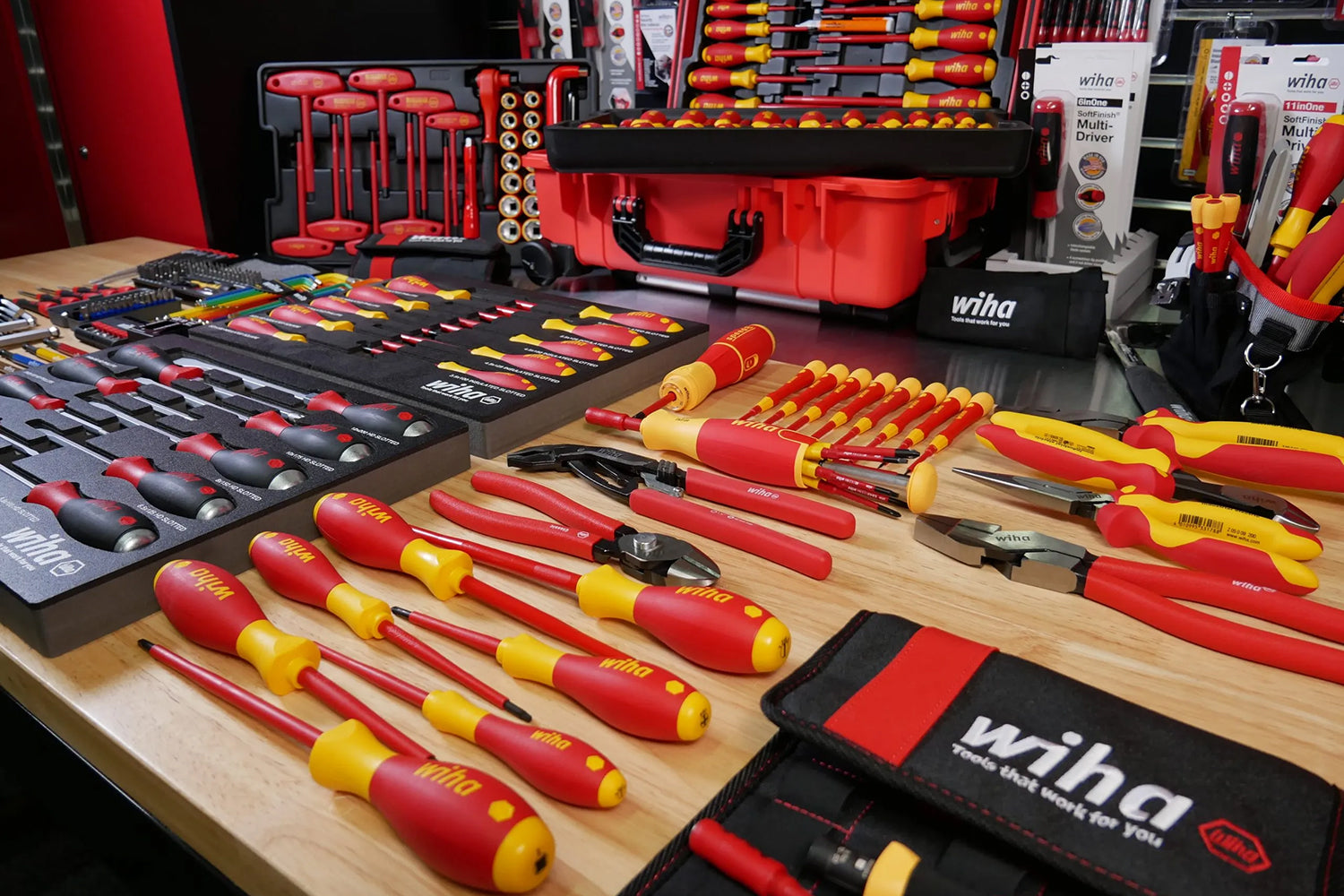
Credit: www.wihatools.com
Frequently Asked Questions
What Tool Do Electricians Use Most?
Electricians most commonly use multimeters. These essential tools measure voltage, current, and resistance in electrical circuits.
What Power Tools Do Electricians Prefer?
Electricians prefer power tools like cordless drills, impact drivers, wire strippers, and multimeters. These tools enhance efficiency and safety on the job.
What Brand Of Power Tools Do Electricians Use?
Electricians commonly use power tools from brands like DeWalt, Milwaukee, Makita, and Bosch. These brands offer reliability and durability.
What Is The Best Tool You Can Buy And Have To Do House Wiring?
The best tool for house wiring is a high-quality wire stripper. It ensures safe, clean wire cuts and connections.
Conclusion
Choosing the right electricians tool set boosts efficiency and safety. Quality tools ensure precise work and durability. Invest wisely in essential tools. A well-equipped electrician is always prepared. Make your job easier and more effective with the best tool set.
Equip yourself for success and tackle any electrical task confidently.

